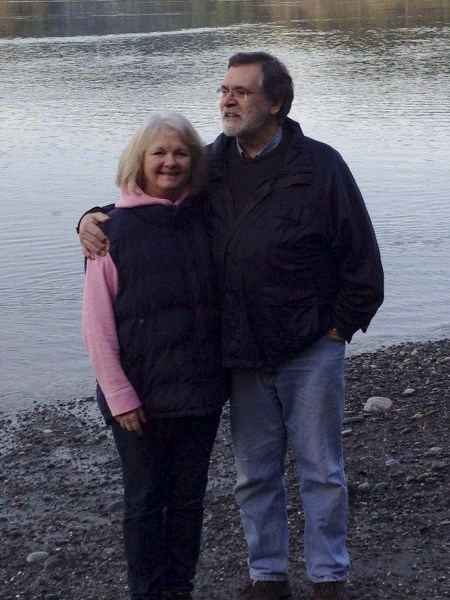A local family learned first-hand the affects of dementia as they watched a loved one slip away earlier this year.
Paul Orritt, who was the pastor of St. Peter’s Anglican Church for 19 years until 2006, moved his wife Koraley back home to Okotoks from Washington last December. They wanted her to be near family and close friends during the final stages of her illness, he said.
Koraley was diagnosed in November 2016 with Creutzfeldt-Jakob disease (CJD), a rare and fatal form of dementia found in one in a million people.
“CJD is known as having a rapid progression,” said Orritt. “From when the physical and neurological symptoms started to show, certainly from about the beginning of December until her death, June 9, you could say it was fairly rapid.”
According to the Alzheimer Society of Canada, a protein found in the brain, called prion, which is harmless in its natural form but toxic to brain cells in its abnormal form causes CJD. There are two main types of CJD – sporadic, which accounts for about 90 per cent of cases and genetic, which makes up most of the other 10 per cent.
Symptoms usually include dementia, unsteadiness, sudden jerky movements, depression and anxiety, vision issues, loss of ability to speak or understand speech and difficulty swallowing.
Orritt said in Koraley’s case, the symptoms began to manifest in the summer of 2015, though they went undocumented for many months. By February 2016, she had confided to a friend in Okotoks that she was convinced she had CJD.
It wasn’t a stretch for Koraley – her mother, two uncles, and at least one cousin had all died from the disease. By the summer of 2016, Orritt said they both began talking openly of the very real possibility she had CJD, and she began seeing a neurologist in Seattle.
It took some time to diagnose because CJD often presents as normal on tests and is notoriously difficult to diagnose until brain autopsies are conducted post-mortem, Orritt said. It was a genetic blood test that confirmed their suspicions.
“She was diagnosed on Nov. 17, which was the day after our 25th wedding anniversary,” said Orritt.
The dementia progressed quickly, he said. By mid-December they decided to return to Okotoks to be near family and ensure she had access to palliative care and home care.
Between February and June, Koraley’s condition worsened.
“There were times when she wouldn’t recognize me, she would think maybe I was her father or sometimes her brother,” said Orritt. “It was questionable sometimes if she really recognized people around her.”
She also began sleeping for up to 20 hours per day, he said.
One thing they learned along the way was how different CJD can be in different people, he said.
“The course of Koraley’s illness was quite unlike the course of her mother’s,” said Orritt. “Her mother was in quite an agitated state, but Koraley was not. I think depending on what part of the brain is being destroyed by the CJD gene it’s going to manifest differently in terms of how it affects a person.”
Though there were some difficult moments along the way, Orritt said taking care of Koraley was never a question and it wasn’t difficult overall. She never expressed any anger or self-pity about her disease, but rather cared more about those around her, he said.
“She actually had gone out on a three-week tour, when she still had some mobility and strength, to visit family and friends, ostensibly to say goodbye,” said Orritt. “But she was also there to encourage them and try to comfort them. It was very easy looking after her because she was very positive.”
He said the home care they received in Okotoks made the journey even easier. Nurses tended to Koraley’s personal care twice per day and palliative care teams provided incredible support, he said.
Toward the end, one of the nurses recommended he place Koraley on the waiting list for the Foothills Country Hospice. It was the most difficult time he’d had during the entire two years of his wife’s illness.
“I really felt I’d let her down, because we had talked about her dying at home,” said Orritt. “I felt I’d failed her. But I spent a day trying to wrestle with making the decision to place her on the hospice waiting list and it was during that time that a couple of things came to my mind. One was I had already looked after her for five months, but more importantly it wasn’t about me, it was about what she needed most.”
Koraley never made it to the hospice. She stopped eating and taking fluids around the end of May until she ended her battle on June 9.
Orritt said he learned some things about dealing with dementia.
First, he said it’s important not to correct the person when they become confused, because it can make the confusion worse. Instead, they learned to play along with Koraley. For example, when she was convinced she had to get to her art show opening the told her the car was in the shop but it would be fixed on time and everything was under control, knowing she wouldn’t remember hours later.
The most important things, he said, are to never lose sight of who your loved one is and never take anything personally.
“When somebody you love moves deeper and deeper into dementia and they begin to forget, for the caregiver that can be really hurtful,” said Orritt. “My advice would be, don’t take it personally. Because they can’t help what their mind is doing to them. Just don’t take it personally, just continue to love them, continue to care for them.”




.png;w=120;h=80;mode=crop)